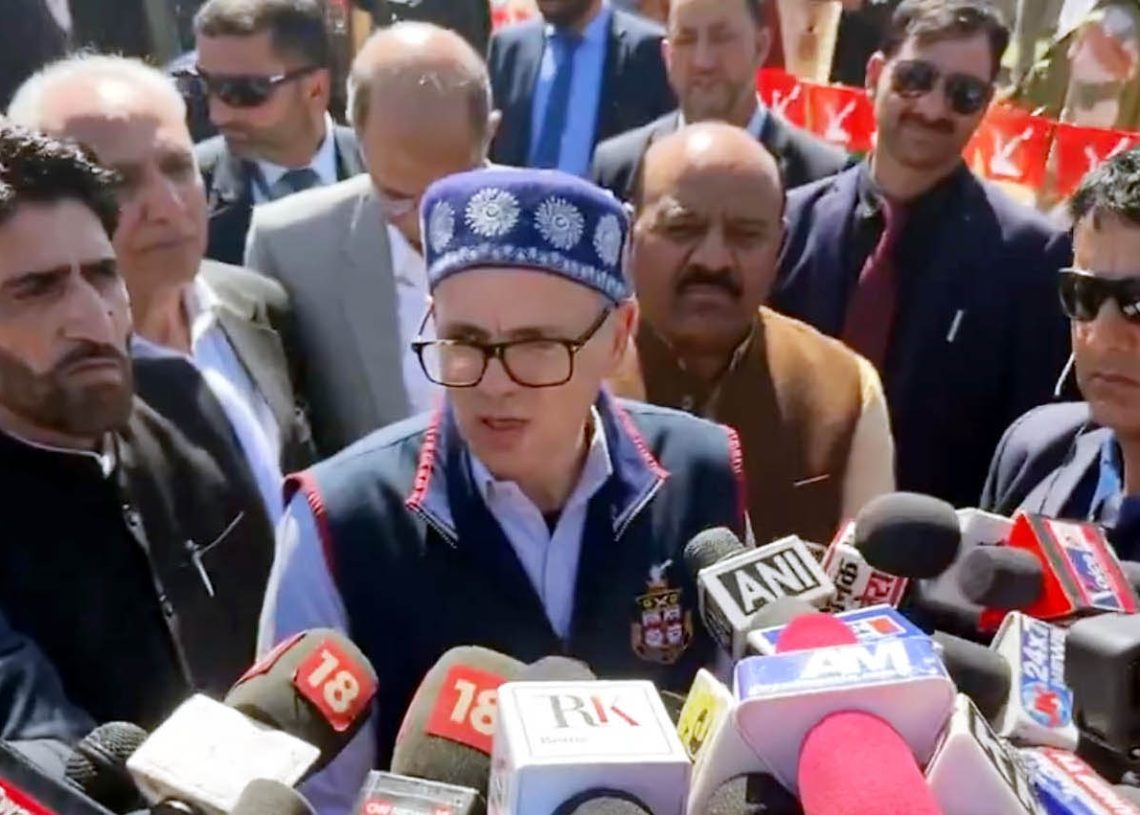A Bold Declaration Amidst Lingering Uncertainty
By: Javid Amin | Srinagar | 25 June 2025
In the picturesque landscape of Gulmarg, a statement was made that cut through the political fog clouding Jammu & Kashmir’s future. Omar Abdullah, former Chief Minister and vice president of the National Conference, declared unequivocally that he would not hesitate to dissolve the Assembly if it became imperative for the restoration of full statehood. Responding to reports suggesting that the Union Government might restore J&K’s statehood only after new elections, Omar replied with disarming candor: “Do it. Who is stopping you? We are not worried about our seats.”
This statement is more than political posturing. It reflects a growing urgency among J&K’s mainstream political leadership to reclaim the dignity and autonomy lost with the abrogation of Article 370 and the bifurcation of the state into Union Territories in August 2019. At stake is not just political power but the constitutional identity of a region with a distinct historical and political trajectory.
Restoration of Statehood: A Constitutional and Emotional Imperative
The demand for statehood is not simply a rallying cry for political relevance. It is a deeply felt aspiration grounded in history, legality, and public sentiment. For decades, Jammu & Kashmir enjoyed a unique status within the Indian Union—one that recognized its special circumstances. The abrupt revocation of this status and the demotion to a Union Territory were viewed by many as a unilateral decision taken without consulting the people of the region.
By offering to dissolve the Assembly, Omar Abdullah is highlighting a critical principle: that statehood is not a privilege granted to MLAs but a constitutional right owed to the people. His stance seeks to reclaim agency for the region’s elected representatives, restoring their ability to legislate and govern as equal partners in the Indian federal framework.
The Political Calculus: Centre vs Region
The Centre’s position has remained ambiguous. While it has repeatedly promised statehood “at an appropriate time,” the timeline remains elusive. Statements from top leaders suggest that elections will precede any discussion on restoring statehood—a sequencing that regional leaders view with suspicion. Omar Abdullah’s challenge disrupts this narrative. By signaling a willingness to forgo immediate power, he is calling the Centre’s bluff: if elections are a precondition, then conduct them and restore statehood as promised.
This defiance also insulates the National Conference from accusations of opportunism. By asserting that seats are secondary to constitutional dignity, Omar positions his party as defenders of democratic principles, rather than political gain.
The Legal Backdrop: Can Statehood Be Restored Through Assembly Dissolution?
Legally, the restoration of statehood does not require Assembly dissolution. However, dissolving the Assembly could serve as a powerful symbolic act, demonstrating political unity and moral clarity. It could send a message that elected representatives are not complicit in a governance model they view as diminished or imposed.
Such a move may also have strategic value. It could compel the Centre to act more decisively, especially if regional parties present a united front and public sentiment continues to mount in favor of full statehood. It would also increase pressure on the judiciary, where the matter remains pending.
Farooq Abdullah and the Supreme Court Option
Echoing his son’s sentiments, veteran leader Farooq Abdullah has not ruled out legal recourse. He warned recently that the NC may approach the Supreme Court if delays continue. This dual approach—political mobilization coupled with legal challenge—reflects a comprehensive strategy to restore what many in J&K believe is their rightful status.
Legal experts agree that the Centre’s reorganization of J&K is not immune to judicial scrutiny. If the Supreme Court were to entertain the case on merit, it could open up new avenues for federalism jurisprudence in India. At the very least, it would keep the conversation alive in national discourse.
Public Sentiment: A Battle for Dignity and Representation
The people of Jammu & Kashmir have endured years of political vacuum, bureaucratic governance, and delayed promises. The restoration of statehood is not merely about a flag or a post. It is about restoring the chain of accountability between elected representatives and their constituents.
Surveys, media reports, and ground feedback indicate that there is significant support for full statehood. People want their leaders to represent them in the Assembly, to legislate for their needs, and to be held accountable. In this context, Omar Abdullah’s willingness to dissolve the Assembly resonates as a people-centric gesture.
The Road Ahead: Risks and Rewards
Omar Abdullah’s declaration is not without risk. Dissolving an Assembly, especially one that has just been elected, could be seen as political instability. It could give the Centre more reason to delay statehood. But it could also galvanize public opinion, unite political forces, and create a moral imperative that the Centre cannot ignore.
In either case, the message is clear: Jammu & Kashmir’s political leadership is prepared to make institutional sacrifices for constitutional restoration. This is a significant shift in tone and strategy—one that prioritizes the region’s dignity over political convenience.
Bottom-Line: A Turning Point in J&K’s Political Struggle
Omar Abdullah’s willingness to dissolve the Assembly is a gamble—but one rooted in conviction. It signals a broader transformation in J&K’s political landscape, where the fight is not just for power but for principle. As statehood continues to dominate the discourse, the coming months will test the resolve of all stakeholders—regional leaders, the central government, and above all, the people of Jammu & Kashmir.
The choice is no longer between Union Territory status and elections. The real choice is between imposed governance and empowered democracy. And the clock is ticking.



